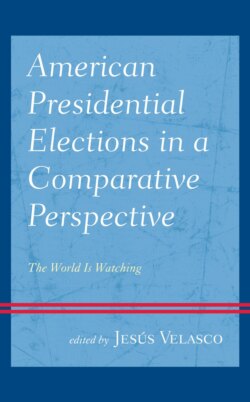Читать книгу American Presidential Elections in a Comparative Perspective - Группа авторов - Страница 29
На сайте Литреса книга снята с продажи.
CHINA’S HISTORICAL VIEWS OF THE UNITED STATES
ОглавлениеChinese views of the United States today are largely the reflection of the major issues and characteristics of China-US relations across different historical periods. From the founding of the People’s Republic of China in 1949 through the Cultural Revolution in the 1960s and 1970s, Chinese perceptions of America were dominated by the irreconcilable differences and extreme hostilities between the two nations.46 As America isolated China politically and economically, recognized the “Republic of China (Taiwan)” diplomatically, and confronted China militarily during the Korean War, China regarded the United States as its archenemy and the “evil imperialist” nation. The Chinese government successfully promoted “a widespread attitude of hatred, disdain, and contempt” for the United States among the Chinese public.47 Chinese hostility and abhorrence of the United States at the time was perhaps best captured by Chairman Mao’s depiction of America as the “paper tiger” with no real strength. As far as Mao was concerned, the United States “invades the world in the name of anti-communism” and “the entire world, including Great Britain, doesn’t like America.”48 Chinese views of the United States before the late 1970s were largely shaped by systematic anti-America propaganda. China’s general public were educated to view America not only as their nation’s biggest threat but also the most sinister Western power trying to destroy their country’s social and political institutions. Meanwhile, China viewed the American “paper tiger” as “deeply wounded by international revolutions and by the erosions of capitalism.”49 The Chinese saw America’s setbacks at home and conflicts abroad as evidence of a struggling nation whose strengths had been substantially undermined by Vietnam and the Civil Rights movement. The Chinese opposition to “American imperialism” was so great that during the Cultural Revolution, a number of Chinese political leaders and intellectuals were prosecuted for being “capitalistroaders,” that is following the examples of American values and lifestyle.
As the two countries found a shared security threat in the Soviet Union, the China-US rapprochement in the early 1970s gradually brought about more positive Chinese perceptions of America. With the establishment of China-US diplomatic relations in 1979, as well as the launching of China’s reform and opening-up programs in the same year, China-US relations improved enormously.50 However, the 1989 Tiananmen student protest led to a grave crisis in China-US relations and served to deepen Chinese suspicions of American intentions of meddling in China’s domestic affairs. China’s views of the United States after Tiananmen fluctuated with the ups and downs of the relationship in the 1990s, and Chinese perceptions of the United States dropped to a historical low after the US bombing of the Chinese embassy in Belgrade in May 1999.51 While Chinese perceptions of the United States have largely remained balanced and stable since 2000, China’s rapid rise has brought new dynamics to the bilateral relationship as well as major changes in Chinese views of the United States.
